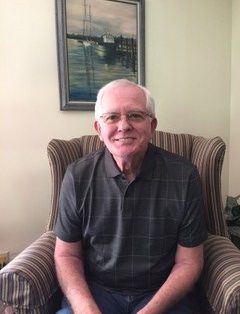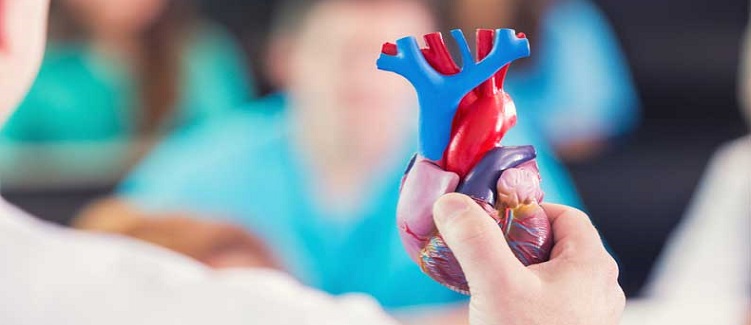Never Miss a Beat!
Subscribe to Our HealthBeat Newsletter!
Thank you for subscribing!
You can now select the specific newsletters you'd like to receive.
You are already subscribed.
Subscribe to more newsletters in our email preference center.
Sorry, an error occurred. Please try again later.
Get Healthy Tips Sent to Your Phone!
The Challenge: Sudden Onset of Broken Heart Syndrome
Tim Valentine of St. Marys still can’t believe what started out as a simple ear surgery turned into a much larger medical emergency.
Tim went in to UPMC Altoona on January 10, 2018 to have a scheduled surgery to repair a perforated ear drum. He expected a somewhat simple procedure without many roadblocks. Little did he know, when he awoke, he would have undergone a life-saving heart procedure.
Tim appeared to be fine leading up to his ear drum surgery. However, once Elliott J. Bilofsky, DO, and his team began operating, Tim’s oxygen levels dropped severely.
“My ENT surgeon said I was actually purple when he looked at me,” Tim explains. Doctors could not get Tim’s oxygen to rise above 80 percent and immediately intubated Tim, still unsure as to what the issue was.
One of Many Reasons to Choose UPMC Altoona: The UPMC Heart and Vascular Institute at UPMC Altoona offers access to the latest diagnostic procedures, evidence-based therapies, and leading-edge treatments.
Our high-volume cardiac catheterization laboratory, advanced heart failure program, and robust vascular surgery program help to set us apart. Explore more reasons to choose UPMC Altoona at UPMCAltoona.org/Reasons.
The Path to UPMC Heart and Vascular Institute
Consulting Tim’s wife throughout the process, as Tim was still under anesthesia, Dr. Bilofsky and the anesthesiologist ordered an urgent echocardiogram – an ultrasound test that assesses the heart’s pumping function and ejection fraction.
Results showed Tim’s ejection fraction was 10 percent. An ejection fraction, or EF, is a measurement that allows doctors to evaluate the efficiency of the main pumping chamber of the heart. An EF represents the percentage of blood pumped out of the left ventricle each time the heart beats, with a normal range being between 55 and 70 percent.

Tim Valentine was treated at UPMC Altoona.
An urgent cardiac consultation was requested. Luckily, George Jabbour, MD, a cardiologist and director of the Cardiac Catheterization Lab at UPMC Altoona, was at Tim’s bedside within five minutes.
RELATED: Breakthrough in Heart Transplants Is a Game-Changer for Patients.
Dr. Jabbour rushed Tim to the cardiac catheterization lab for an emergency catheterization. Time was of the essence, as Tim’s oxygen levels dropped to 50 percent and his blood pressure was extremely low, indicating that he was going into a deep shock state.
Tim was brought into the catheterization lab less than 30 minutes later. Heart catheterization confirmed that although Tim’s arteries were clear of blockages, his heart was only pumping at 10 percent.
The Solution: A Temporary Heart Assist Device
Dr. Jabbour diagnosed Tim with “broken heart syndrome,” also known as Takotsubo cardiomyopathy or stress cardiomyopathy, which occurs when a heart, overwhelmed by a stressful event, suddenly becomes stunned. This leads to a significant drop in blood pressure and compromises the delivery of blood to vital organs. Swift treatment for patients with broken heart syndrome is essential to increase the likelihood of a full recovery.
Dr. Jabbour immediately placed a small pump, called the Impella®, into Tim’s heart to aid the left ventricle while his heart recovered from the shock. This pump, a new technology available locally at UPMC Altoona, imitates the normal heart functions, doing the work for the ailing heart while waiting for it to recover. Dr. Jabbour was confident that Tim would be recovering in about 24 to 48 hours.
Tim awoke in the ICU the next afternoon, completely unaware that heart surgery had occurred. Dr. Jabbour removed the pump 24 hours after it had been placed, and Tim’s heart function subsequently recovered. Initially feeling a little shocked at what had transpired while he was under anesthesia, Tim quickly found some humor in the situation, saying, “when Dr. Bilokfsky came in to check on me, I jokingly asked him what had happened. I came in for ear surgery and woke up to find out they had operated on my leg and groin!”
Tim looks back now at the day’s events and just feels grateful to have been in the right place, with the right team, when he needed them most. “I feel as good, if not better, than before,” he exclaims.
Tim had a follow-up appointment with Dr. Jabbour, who noted that everything looked great and Tim was not in need of any additional treatment or medication at this time.
Tim expresses his appreciation for UPMC Altoona, stating, “UPMC Altoona is a beautiful facility and the staff is great. I cannot say enough good things about everyone, especially Dr. Jabbour and his wonderful team.”
The physicians and staff at UPMC Altoona are especially proud of their team efforts to address and correct Tim’s sudden issues. Both Dr. Bilofsky and Dr. Jabbour credit their surgical staff and each other’s quick reactions and ability to seamlessly work together as the reasons they were able to save Tim’s life that day.
Now fully recovered from his broken heart syndrome, Tim and his wife have gotten back to doing the things they love, including traveling to visit their daughters in Arizona and Nashville, spending time outdoors, and oil painting – a hobby of Tim’s. Tim remains thankful for the care he received at UPMC Altoona and recognizes that his outcome could have been much different, saying, “If I hadn’t been at UPMC Altoona and they hadn’t had the Impella there, I would not have made it.”
Tim’s treatment and results may not be representative of similar cases.
Impella® is a registered trademark of Abiomed.
About Heart and Vascular Institute
The UPMC Heart and Vascular Institute has long been a leader in cardiovascular care, with a rich history in clinical research and innovation. As one of the first heart transplant centers in the country and as the developer of one of the first heart-assist devices, UPMC has contributed to advancing the field of cardiovascular medicine. We strive to provide the most advanced, cutting-edge care for our patients, treating both common and complex conditions. We also offer services that seek to improve the health of our communities, including heart screenings, free clinics, and heart health education. Find an expert near you.
